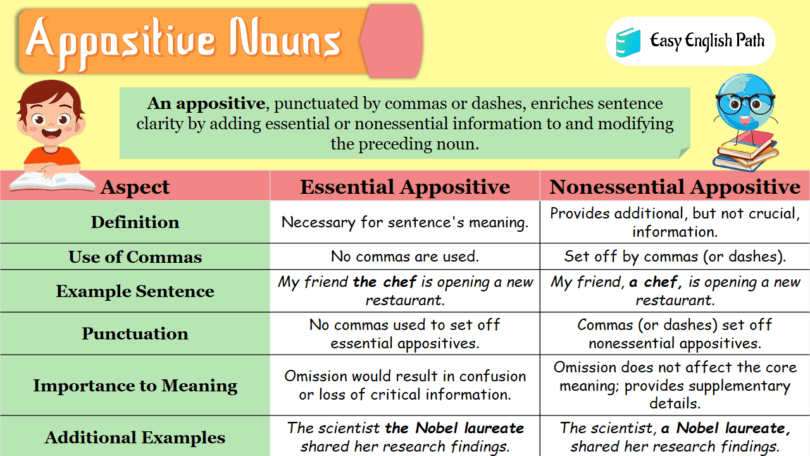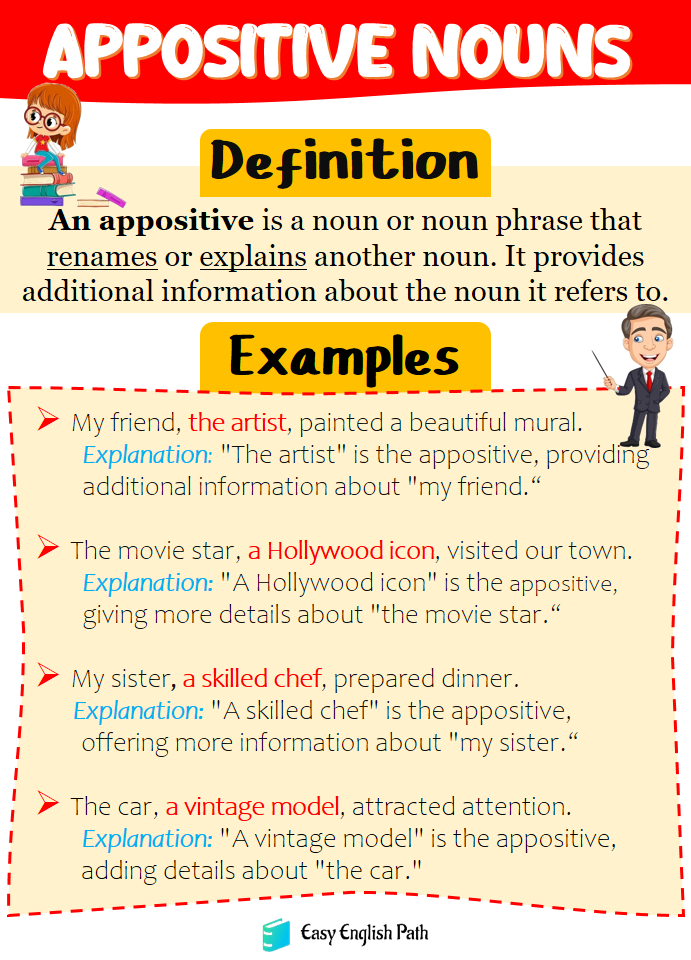Appositive Nouns ae used to add more information about a person, place, or thing. Imagine you have a friend, let’s call him “Tom, the chef.” Here, “Tom” is the main person, and “the chef” is an appositive telling us more about Tom. Appositives Nouns Examples make sentences more interesting by giving extra details. So, if you want to talk about your friend, dog, or even a toy, you can use appositive nouns to share more about them. It’s like adding a little extra spice to your words, making them more fun and clear.
What are Appositive Nouns?
An appositive noun is a noun or noun phrase that renames or explains another noun right next to it. It is a form of apposition, a grammatical construction in which two elements, often nouns or noun phrases, are placed side by side, with one element providing additional information or clarification about the other.
Examples:
- The author, J.K. Rowling, wrote Harry Potter.
- The city, of New York, is bustling.
- Our guide, Mr. Johnson, shared insights.
- The captain, Sarah, led her team.
Categories of Appositive Noun:
Appositive nouns can fall into various categories based on the nature of the information they provide. Here are some common types of appositive nouns:
- Identifying Appositives
- Explanatory Appositives
- Appositives of Quantity or Number
- Appositives of Place
- Appositives of Time
- Occupational Appositives
- Title Appositives
- Appositives in Lists
Identifying Appositives:
Identifying appositives specifies which one or what kind of noun is being referred to.
Examples:
- My friend, the artist, painted a beautiful mural.
- The car, a sleek sports coupe, roared down the highway.
- Our neighbor, the professor, hosted an intellectual discussion.
In each case, the appositive adds descriptive or specific details to the main word, helping to clarify or enhance the meaning of the sentence.
Explanatory Appositives:
Explanatory appositives provide additional information to explain or describe a noun. The main word, which is being further clarified, is often set off by commas.
Examples:
- I met my new neighbor, Susan, yesterday.
- The dessert, chocolate cake, is my absolute favorite.
- The author, J.K. Rowling, wrote the famous Harry Potter series.
Appositives of Quantity or Number:
Appositives of quantity or number provide additional information about the amount or number associated with a noun.
Examples:
- She bought three dresses, her favorite color being blue.
- The team scored seven goals, a new record for the season.
- They adopted two puppies, both from the same litter.
- He caught a dozen fish, a feat that impressed the other anglers.
Appositives of Place:
Appositives of Place provide additional information about the location associated with a noun.
Examples:
- We visited the charming village, of Paris, last spring.
- The conference will take place in the historic city, of Rome.
- Our hotel overlooked the beautiful bay, of Miami.
- The event is happening at the lively square, Times Square.
Appositives of Time:
Appositives of time provide information about the time associated with a noun.
Examples:
- I’ll meet you at the park at sunset, my favorite time of day.
- The concert, happening tonight, features a popular band.
- Our appointment, set for noon, is in the conference room.
- She plans to finish the project by Friday, the deadline.
Occupational Appositives:
Occupational appositives provide information about a person’s profession or occupation.
Examples:
- My friend, the chef, prepared a delicious meal for us.
- The artist, Pablo Picasso, created iconic works of modern art.
- Our neighbor, the firefighter, bravely saved a cat from a tree.
- The guest speaker, the lawyer, discussed legal rights and responsibilities.
Title Appositives:
Title appositives provide additional information about a person by specifying their title or position. The main word, often the title or position, is typically bolded for emphasis.
Examples:
- I interviewed the architect, Sarah Johnson, for our design project.
- Please welcome Officer Daniels, our local community police officer.
- Chef Anderson prepared a delightful three-course meal for the gala.
- The seminar will be conducted by Professor Lee, an expert in astrophysics.
Appositives in Lists:
When using appositives in lists, they help provide additional information about the items listed.
Examples:
- I enjoy painting different colors: red, my favorite, blue, and green.
- The team has skilled players: Sarah, the captain, Alex, and Emily.
- She ordered three pizzas: pepperoni, her go-to, vegetarian, and margarita.
- The menu offers diverse options: pasta, a classic dish, salad, and soup.
Appositive Nouns Examples:
- My friend, Alexis, loves to paint.
- The actor, Brad Pitt, is famous.
- The president, John Adams, signed an important act.
- The chef, Julia Child, wrote cookbooks.
- My neighbor, Dr. Anderson, is a cardiologist.
- The car, a red Ferrari, is fast.
- The author, J.K. Rowling, wrote Harry Potter.
- The city, of New York, is bustling.
- Our guide, Mr. Johnson, shared insights.
- The captain, Sarah, led her team.
You May Also Like this






